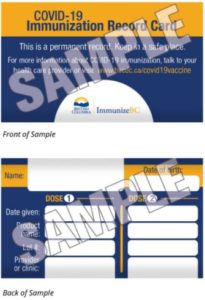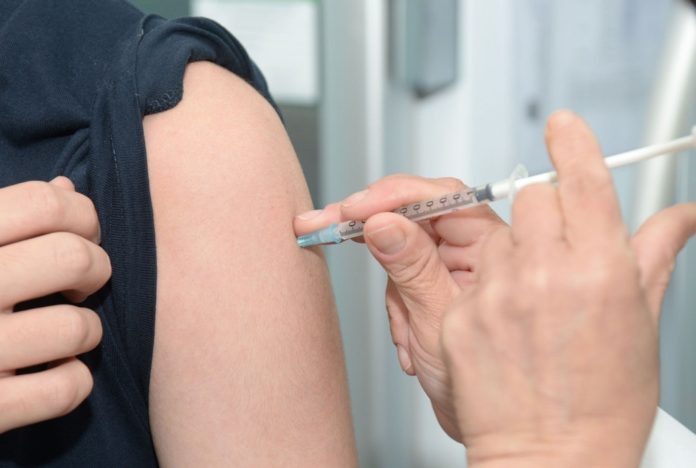The province has laid out its plans for COVID-19 immunizations over the next nine months.
With Canada committed to offering vaccines to every Canadian who wants them by the end of September, B.C. is working to align to this timeline.
Immunization will be coming in four phases, with vaccines from Pfizer, Moderna, and AstraZeneca, which is expected to be approved for delivery in the second quarter of 2021.
Health Canada has approved Pfizer and Moderna for use in adults over the age of 16 only. Clinical trials are underway at the pharmaceutical companies to determine if they are safe for children.
The province says approximately 4.3 million people are eligible for the vaccines, which have been approved for adult-use only.
As all the current vaccines are 2-dose programs, that means B.C. will require 8.6 million doses.
Dr. Bonnie Henry says that age is the primary driving factor behind the government’s vaccine prioritization.
However, considerations will be made for early vaccination of younger individuals with identified high-risk clinical factors, such as people with specific cancers or who recently received solid organ transplants.
These people will mainly be identified from information provided by their primary care providers.
Here’s how the four phases will roll out, and when you can expect to receive your vaccination:
Phase 1 — current, until February 2021
Currently, B.C. is prioritizing vaccines for residents and staff of long-term care facilities, remote or isolated First Nation communities, and higher-risk hospital, paramedic and public health staff.
As of Thursday, January 21st, 104,901 people have received vaccinations across B.C.
By the end January, the province is estimating they will have vaccinated 148,000 people, including 70,000 residents and staff of long term care facilities, 25,000 members of remote First Nation communities, and 30,000 higher-risk health care staff.
Phase 2 — February to March 2021
In the second phase, B.C. will slightly widen its high-risk groups to include these individuals who were not immunized in phase 1:
- seniors aged 80 and over
- indigenous seniors and elders aged 65 and over
- additional indigenous communities
- hospital staff, general practitioners and medical specialists
- vulnerable populations living and working in select congregated settings
- community home support staff and nurses caring for seniors
Health Authorities will reach out to these groups in mid to late February for information on how to pre-register for immunization appointments.
Information on this pre-registration process will be detailed in weeks to come.
By the end of Phase 2, the province estimates they will vaccinate an additional 372,000 people.
Phase 3 — April to June 2021
Phase 3 is when vaccinations will start becoming available for the general public.
Age will continue to be the key factor in determining priority, beginning with people aged 79 to 60, in groups of five-year increments.
Doses will be roughly administered for these age groups in these months:
- 79 to 75, 74 to 70 (first dose – April, second dose – May)
- 69 to 65 (first dose – May/June, second dose – June/July)
- 64 to 60 (first dose – June, second dose – July)
In addition, people aged 69 to 16 who are clinically extremely vulnerable may receive doses between April to June.
Clinically vulnerable individuals include:
- people with specific cancers, such as lung cancer or leukemia
- people who received solid organ or bone marrow transplants
- people with severe respiratory illnesses such as cystic fibrosis, severe asthma or chronic obstructive pulmonary disease
- people with rare immunodeficient conditions such as homozygous sickle cell disease
- people who have had a splenectomy
- adults on dialysis or with stage 5 chronic kidney disease
- pregnant women with significant heart disease
More vaccines, such as Johnson and Johnson and Medicago are currently making their way through the approvals process.
If these are approved and become available, more people between the ages of 18 to 64 who are front-line essential workers or work in specific industries may be included in the latter part of Phase 3.
In late February, the province will be starting a communication campaign that includes information on how to pre-register for a vaccine appointment.
172 vaccination clinics will be set up across the province, including mobile clinics and home visits where necessary for patients who are unable to travel.
Clinics will be set up at large centres including gymnasiums, arenas, convention halls and community centres.
Pre-registration will be open through an app, as well as online and by phone. Participants will be able to register two to four weeks before their vaccine eligibility.
For example, pre-registration for residents of B.C. aged 79 to 75 will open in March 2021.
From April to the end of June, the province expects to receive 2,640,000 doses of vaccine, enough for over 1.3 million people.
Phase 4 — July to September 2021
In the final phase of the immunization rollout, the general public under the age of 60 will receive their vaccines.
As with Phase 3, Phase 4 will distribute doses in age groups divided by five-year increments:
- 59 to 55, 54 to 50, 49 to 45, 44 to 40 (first dose – July, second dose – August)
- 39 to 35 (first dose – July/August, second dose – August/September)
- 34 to 30 (first dose – August, second dose – September)
- 29 to 25 (first dose – August/September, second dose – September)
- 24 to 18 (first and second dose – September)
Pre-registration will still be required for vaccines, with registration opening two to four weeks in advance of an individual’s valid date.
Any resident of B.C. who receives a vaccination will have the option to retain a paper and/or digital record of their immunization.

The paper record will take the form of an immunization record card with information on the recipient’s name, date of vaccination, and type of vaccine.
Information on vaccination records will be stored on a provincial database.
At a press conference on Friday, Dr. Bonnie Henry said that we may see a loosening of restrictions in the summer.
“I do believe we’ll have some leeway,” she said. “If we start to bring our numbers down by February, that’s when the next revision of our orders is potential.”
However, Dr. Henry cautioned new strains that have appeared in B.C., including the UK variant, do make the virus more transmissible and we could see a rapid increase in cases again.
“I am hopeful that once we start getting the most at-risk people immunized, we start having enough people in the population so that it makes it more challenging for the virus to transmit between people,” she added.
“We know it doesn’t transmit as easily in the spring and summer. By the summer, we should be able to have some types of our normal lives back again. But the full, back to what we would like to have…is not likely until the fall.”


